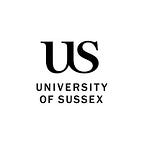“This is the history I enjoy. It’s about people’s emotions and feelings”
Ella Beales, who graduated this year with a First in English Literature and History at the University of Sussex, has volunteered at The Keep since 2017. She is now helping to catalogue and digitise the Mass Observation archive, a unique collection of writings of everyday life by volunteers.
I heard about Mass Observation during a seminar in my first year. And then, at the start of the second year I went on a tour of The Keep and found it so interesting that I asked if there were any volunteering slots. I started cataloguing the University of Sussex’s Special Collections’ archive of Norman Longmate, a social historian who wrote several books and made TV progammes, and then I moved on to collating the annual one-day diaries written on 12 May this year for Mass Observation.
I used the MO for my undergraduate dissertation. I wanted to look at tea drinking in the Second World War. To begin with I was a little worried that I wouldn’t have enough material. But some people wrote page after page about one cup of tea. I enjoyed looking at the social and psychological importance of drinking tea. There were stories of people leaving their air raid shelters during the Blitz and running back into the house because they had forgotten to bring the tea. They often wrote about how they needed it to keep calm and help settle their nerves.
I’ve never kept a diary myself as I didn’t think that I had anything interesting to say. But now I am fascinated by the little details of people’s lives. People write in so many different ways. For the May diaries, sometimes they start with saying what time they got up and the general activities of their day. Others might talk about their feelings, or reflections on what has happened in their life. They might talk about grieving for someone, or something might trigger a memory of what happened to them 20 years ago. This year there was a massive focus on gardening, which surprised me, and also on plastic pollution and climate change, which is not surprising.
It’s more interesting when people talk about their feelings in the diaries. One person wrote that they could never understand when they were younger why old people liked gardening, but now they understood it. They talk about the joy of growing things in their garden with their grandchildren, pointing out that it’s a way of staying connected with their family and neighbours, and of giving them a purpose. I had never thought about gardening as having that power.
Now I am working on a project to digitise the Mass Observation archive, so I am writing to anyone who has been a contributor since the 1980s, of which there are thousands, to ask their copyright permission. I’m also continuing to work on the Norman Longmate collection.
I’m intending to take a Masters in contemporary history, part time. I would love to carry on working with these archives, perhaps doing a doctorate, because this is the history that I enjoy. It’s about people’s emotions and feelings. I feel I am connecting with the person who wrote it, and sharing that moment with them. It’s so different to how I learned history at school, which was all about kings and queens.
I share an interest in history with my Dad. He worked away in Africa when I was younger (as a healthy and safety advisor in the oil and gas industry) but always used to take me and my brother to museums whenever he was back in England. He did an MA in history and is now doing a PhD in history.
I’m from a tiny village in Gloucestershire called North Nibley, but when I came to Sussex I felt at home straight away. That doesn’t always seem to be the experience of many of my friends who went to other universities. I developed symptoms of ME [myalgic encephalomyelitis, also known as chronic fatigue syndrome] during my third year, and the University was really supportive in giving me extra time for exams and deadlines. My friends here were wonderful, often coming to sit with me in my room — sometimes in the complete dark — when I had headaches and didn’t have the energy to go out. I’m learning how to manage my illness now, which is why I am only working part-time and intend to study part time. I feel very lucky to be part of such as supportive community.
Interview by Jacqui Bealing
This profile is part of our This Sussex Life series.
Visit the University of Sussex website
